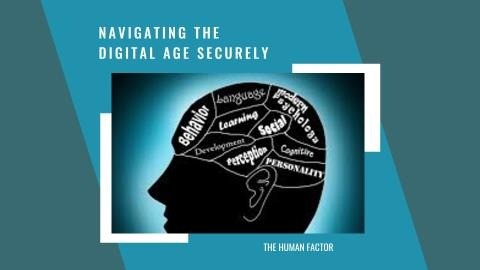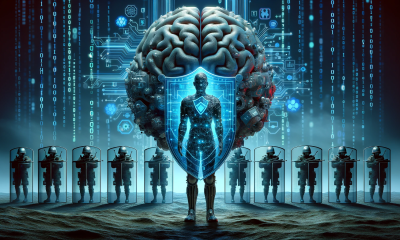News
Navigating the Digital Age: Why Cybersecurity is Everyone’s Responsibility

By Abuh Ibrahim Sani
Introduction
As technology continues to evolve, the significance of cybersecurity cannot be underestimated. Cyber threats continue to increase daily, with hackers developing sophisticated tools to carry out heinous acts; individuals and corporate bodies must arm themselves with the basic knowledge and tools to navigate the digital landscape safely.
The challenge of Internet security has grown significantly. Nearly everything we use, see, or come into contact with is online, including wearable technology, home appliances, cell phones, and even partially driverless cars. Businesses, governments, and other institutions may access trade secrets, medical information, and financial data remotely thanks to the Internet. This is the paradox of connectivity; the more interconnected our computer systems are, the more vulnerable they are to data theft, malware, operational disruption, and even outright physical harm to network and hardware infrastructure.
Despite the efforts of industries, corporate bodies and government to protect cyberspace, there is a greater threat which stands as the worst part of threats – the human factor and psychology. No matter the number of security devices like firewalls, intrusion detections, and intrusion prevention tools put in place by organizations can guarantee sufficient security without addressing the human element and its impact on security. The failure to consider human psychological means there is no security. There is a need for education, training, and awareness that cybersecurity is everyone’s business not the sole responsibility of IT professionals or cyber experts. It is a collective effort to protect cyberspace, data and network infrastructure. There is so much ignorance on the issue regarding cybersecurity that needs to be addressed. The absence of basic cybersecurity knowledge makes small and medium enterprises vulnerable to attacks, allowing attackers to steal from people and their assets. There should be a rigorous campaign in public gatherings such as schools, parks, etc. An effective cyberattack against one person frequently leads to a cyberattack against an organisation. Additionally, if they are not trained to recognise the telltale signs of a cyberattack, they may unintentionally allow an attacker in by the front door or rear door.
Cybersecurity is a crucial issue in the digital age, yet its complexities can be intimidating for everyday users. This paper aims to bridge that gap by offering a clear and practical approach to cybersecurity education.
One of the main concerns in safeguarding a country’s cyber sovereignty from hostile activity is through education and awareness. This demonstrates how crucial cybersecurity education is to foster the development of a robust cybersecurity ecosystem promote cyber sovereignty create safe digital and IT infrastructure and services, protect against advanced cyberattacks, and raise people’s knowledge and maturity in cybersecurity.
Global authorities and people alike are increasingly concerned about cybersecurity resilience, especially as people’s awareness of their privacy is growing. Therefore, we assume that educating people about cybersecurity is essential to building a society and businesses that are resilient and secure online.
Understanding Cybersecurity Basic
In a modern world dominated by technology, the term “Cybersecurity” has become important in ensuring the integrity, confidentiality and availability of digital information. Cybersecurity can be described as the practice of protecting computer systems, networks, and data from theft, damage, or unauthorized access. It involves developing mechanisms and strategies to defend against a diverse array of cyber threats. In the field of cybersecurity, the biggest threat often lies not in technology, but in the human element. Despite improvements in digital security measures, social engineering attacks continue to exploit the most vulnerable part of any security system; the people who use it. These attacks underscore a significant challenge, as they involve persuading individuals to give out sensitive information or take actions that put security at risk. Cybercriminals are using more and more advanced methods, such as psychological manipulation, to get around technical defences. This study seeks to shed light on the strategies employed in social engineering attacks and highlight the significant impact of human elements in cybersecurity. By identifying and resolving these weaknesses, we can enhance the security of sensitive data and improve overall safety measures. Emphasizing human factors is not just a component of cybersecurity, but it is the key to a strong security plan.
Why Cybersecurity Matters, Even for everyday users?
Cybersecurity might seem like a concern reserved for IT professionals, but that’s not the case. In our increasingly connected world, where our personal and professional lives rely heavily on digital tools, cybersecurity is crucial for everyone.
We entrust a vast amount of sensitive information to online platforms, from financial records ,medical record to personal details. Unfortunately, some of these platforms don’t always have adequate security measures in place. This leaves our information vulnerable to theft and misuse. Every online interaction contributes to building our digital identity. Cybersecurity helps safeguard our privacy by protecting our accounts from unauthorized access and threats. It prevents identity theft and ensures the confidentiality of our information .
In July 2016, The DNC email leak is a prime illustration of how social engineering can result in a significant security breach. Hackers were able to access the DNC’s email system by carrying out a phishing attack. A legitimate Google security team sent an email to DNC staff members, asking them to reset their passwords. When staff clicked the link and entered their login information, they unknowingly gave hackers access to their email accounts. This incident revealed important political communications and caused significant consequences. Social engineering and the significance of securing account recovery protocols, staff training and awareness.
Economic Implications of Cyber Theft
Individuals, businesses and industries are prime targets of cyber threats. For startups and multinational companies, the consequences of cyber-attacks and theft can be devasting and significant, leading to financial losses, reputational damage, and even bankruptcy in some terrible cases.
In 2021, Facebook suffered a data breach that leaked users’ information. The breach emerged that a total of 533 million users’ personal information was compromised. The attack cost Facebook a total cost of $3.7 billion. And also, In 2017, Equifax suffered a data breach due to poor cybersecurity handling and management. The breach resulted in approximately 143 million American customers losing their personal information such as social security number, date of birth, driver’s license, addresses and other sensitive information. The company pays compensation to the tune of $ 1.3 billion as a consequence of the data breach. These losses are due to poor measures or negligence by the company which affected individuals. These examples highlight the impact of human error in cyber-attack.
A lack of knowledge and awareness of the importance of cybersecurity has led to many losses. There is an urgent need for an aggressive campaign to educate the masses on how cyber theft can harm their lives and businesses. Business loss and data theft are on the increase daily due to ineffective policy, protection and awareness among the people, resulting in economic loss.
A shared Responsibility
Contrary to the perception and belief of the populace that cybersecurity is a thing of IT professionals, in a real sense, cybersecurity is everyone’s responsibility. Responsibilities that require the active participation of every individual who interacts in the digital world and outside the platform. Anyone can be a victim of cybercriminals, either online or offline. Every person has a role to play to have a safe cyberspace . These roles range from using a strong password for an online application or platform to knowing who you share information with and what information you share with people. Individuals and corporate bodies are responsible for securing credit cards, debit cards, and other sensitive information. Being vigilant would protect everyone and loved ones from social engineering, phishing and other forms of hackers’ tricks of obtaining information. Phishers do not use advanced technologies; instead, they take advantage of human nature to commit hacking. There is a dearth of knowledge on which ring in the information security chain is first compromised, even though people are more to blame for the chain’s fragility than technology. Research has shown that certain personality traits increase a person’s susceptibility to different types of lures.
To back up the point why cybersecurity is a shared responsibility. In 2021, a Colonial Pipeline Ransome attack resulted in a shortage of fuel across the southeastern United States. The attacker exploited a compromised password to gain access to the company network. This breach demonstrated how a weak password can lead to widespread disruptions. Also in 2020, a Zoom security incident occurred during covid-19 pandemic when a user failed to secure the meeting with a password or used public links which allowed uninvited participants to disrupt the meetings. Individuals need to comprehend and make use of security options offered by platforms, like implementing passwords for meetings and utilizing waiting areas . This scenario shows that cybersecurity is more than just technical solutions; it also involves user behaviour and awareness. Security cannot be achieved by simply installing a robust security system. Ignoring the human factor and failing to raise awareness will lead to security breaches.
Social Engineering (Exploiting Human Psychology)
Social Engineering is an act of obtaining sensitive information from victims through pretence. An attacker could come as a legitimate person and obtain information without the victims verifying their identity before releasing information. Social Engineering is increasing, according to statistics due to technological advancement and attractiveness in the world. Many have fallen for social engineering attacks, and many will still be victims. There is a need for a holistic approach by government and policymakers to develop strategies on how to educate and create awareness for the masses to be aware of whom they share information with and what to share. A zero-base trust mindset should be encouraged. An organization needs to do more to train employees, both recruits and old staff, to be aware of hackers’ tricks. Hackers can pretend to be staff members of a company and come in the way of helping an employee in distress, but in a real sense, it’s an act to obtain valuable information from the staff. Hackers’ tricks involve playing with human thinking and behaviours, the act of deceiving and convincing to get sensitive information about individuals or organizations.
Social engineering is the psychological manipulation of people into performing actions or divulging confidential information. Unlike other cyber threats that depend on the use of software and online platforms and loopholes in the system, social engineering targets human elements, exploiting their weaknesses and the natural tendency to trust. This can be done offline without the use of any software. It is just a matter of technique and tactics. It is called “Master the Art”.
In July 2020, Twitter experienced a significant breach in which numerous prominent accounts were taken over to endorse a Bitcoin scam. The attackers employed phone spear phishing to deceive Twitter employees into giving access to internal tools. They pretended to be IT department staff and persuaded employees to disclose their credentials during phone calls. Upon gaining entry, the intruders seized verified accounts of significant individuals and businesses, sharing messages requesting Bitcoin from followers with a pledge to double their investment. This event demonstrates how social engineering can be used to target insiders to access important systems. Social engineering attacks can be carried out in different format such phishing, shoulder surfing, malware, phone, social media chat, ransomware, malware, eavesdropping. These are easy because of human error and behaviour toward their information security.
Information security is everyone’s business, it’s your primary responsibility to protect your data from being compromised and stolen. Hackers are aware that human beings are the easier target so they leverage the emotional state, negligence, carelessness, and ignorance to steal information. Many are victims of social engineering and many will still fall because people tend to forget the basic principles of security. It’s human nature, however, all hope is not lost if you take precautionary measures to protect yourself and your organization. Companies with sophisticated security appliances have been hacked due to human error. Protect your password like your life, no one should have access to your password even if the person is the IT of your company. Remember, the protection of your information is your responsibility. No security measure can prevent your data from being stolen if you give free access to the attacker. In simple interpretation, if you leave your door open without locking it, you will know what the outcome would be.
Headlines
Noble Ladies Champion Women’s Financial Independence at Grand Inauguration in Abuja

Women from diverse backgrounds across Nigeria and beyond gathered at the Art and Culture Auditorium, Abuja, for the inauguration and convention of the Noble Ladies Association. The event, led by the association’s Founder and “visionary and polished Queen Mother,” Mrs. Margaret Chigozie Mkpuma, was a colourful display of feminine elegance, empowerment, and ambition.
The highly anticipated gathering, attended by over 700 members and counting, reflected the association’s mission to help women realise their potential while shifting mindsets away from dependency and over-glamorization of the ‘white collar job.’ According to the group, progress can be better achieved through innovation and creativity. “When a woman is able to earn and blossom on her own she has no reason to look at herself as a second fiddle,” the association stated.
One of the association’s standout initiatives is its women-only investment platform, which currently offers a minimum entry of ₦100,000 with a return of ₦130,000 over 30 days—an interest rate of 30 percent. Some members invest as much as ₦1 million, enjoying the same return rate. Mrs. Mkpuma explained that the scheme focuses on women because “women bear the greater brunt of poverty” and the platform seeks “to offer equity in the absence of economic equality.”
Education is also central to the Noble Ladies’ mission, regardless of age. Their mantra, “start again from where you stopped,” encourages women to return to school or upgrade their skills at any stage in life. The association believes that financial stability is vital in protecting women from cultural practices that dispossess widows of their late husbands’ assets, while also enabling them to raise morally and socially grounded families.
Founded on the vision of enhancing women’s skills and achieving financial stability, the association rests on a value system that discourages pity and promotes purpose. “You have a purpose and you build on that purpose to achieve great potentials and emancipation,” Mrs. Mkpuma said.
A criminologist by training and entrepreneur by practice, she cautions against idleness while waiting for formal employment. “There are billions in the informal and non-formal sectors waiting to be made,” she said, rejecting the “new normal of begging” and urging people to “be more introspective to find their purpose in life and hold on to it.”
Mrs. Mkpuma’s management style keeps members actively engaged, focusing on vocational skills and training to prepare them for competitive markets. She is exploring “innovative integration of uncommon technologies” and is already in talks with international franchises to invest in Nigeria, with Noble Ladies as first beneficiaries.
The association’s core values include mutual respect, innovation, forward-thinking, equal opportunity, and financial emancipation. With plans underway to establish a secretariat in the heart of Abuja, the group aims to expand its impact.
The event drew high-profile guests, including former Inspector General of Police, Mike Okiro, and a host of VIPs, marking a significant milestone in the association’s drive for women’s empowerment.
Headlines
NEPZA, FCT agree to create world-class FTZ environment

The Nigeria Export Processing Zones Authority (NEPZA) has stepped in to resolve the dispute between the Federal Capital Territory Administration and the Abuja Technology Village (ATV), a licensed Free Trade Zone, over the potential revocation of the zone’s land title.
Dr. Olufemi Ogunyemi, the Managing Director of NEPZA, urged ATV operators and investors to withdraw the lawsuit filed against the FCT administration immediately to facilitate a roundtable negotiation.
Dr. Ogunyemi delivered the charge during a courtesy visit to the Minister of the Federal Capital Territory, Barrister Nyesom Wike, on Thursday in Abuja.
You will recall that the ATV operators responded to the revocation notice issued by the FCT administration with a lawsuit.
Dr. Ogunyemi stated that the continued support for the growth of the Free Trade Zones Scheme would benefit the nation’s economy and the FCT’s development, emphasizing that the FCT administration recognized the scheme’s potential to accelerate industrialisation.
Dr. Ogunyemi, also the Chief Executive Officer of NEPZA, expressed his delight at the steps taken by the FCT minister to expand the economic frontier of the FCT through the proposed Abuja City Walk (ACW) project.
Dr. Ogunyemi further explained that the Authority was preparing to assess all the 63 licensed Free Trade Zones across the country with the view to vetting their functionality and contributions to the nation’s Foreign Direct Investment and export drives.
“I have come to discuss with His Excellency, the Minister of the Federal Capital Territory on the importance of supporting the ATV to succeed while also promoting the development of the Abuja City Walk project. We must work together to achieve this for the good of our nation,” he said.
On his part, the FCT Minister reiterated his unflinching determination to work towards President Bola Ahmed Tinubu’s Renewed Hope Agenda by bringing FDI to the FCT.
“We must fulfil Mr. President’s promises regarding industrialization, trade, and investment. In this context, the FCT will collaborate with NEPZA to review the future of ATV, a zone that was sponsored and supported by the FCT administration,” Wike said.
Barrister Wike also said that efforts were underway to fast-track the industrialisation process of the territory with the construction of the Abuja City Walk.
The minister further said the Abuja City Walk project was planned to cover over 200 hectares in the Abuja Technology Village corridor along Airport Road.
According to him, the business ecosystem aimed to create a lively, mixed-use urban center with residential, commercial, retail, hospitality, medical, and institutional facilities.
He added that the ACW would turn out to be a high-definition and world-class project that would give this administration’s Renewed Hope Agenda true meaning in the North-Central Region of the country.
Barrister Wike also indicated his continued pursuit of land and property owners who failed to fulfil their obligations to the FCT in his determination to develop the territory.
Headlines
Benue IDPs block highway, demand return to ancestral homes

Vehicular movement along the Yelwata axis of the Benue–Nasarawa highway was brought to a standstill on Wednesday as Internally Displaced Persons, IDPs, staged a protest, demanding immediate return to their ancestral homes.
The protesters, believed to be victims of persistent attacks by suspected herdsmen, blocked both lanes of the busy highway for several hours, chanting “We want to go back home”.
The protest caused disruption, leaving hundreds of motorists and passengers stranded.
Eyewitnesses said the displaced persons, many of whom have spent years in overcrowded IDP camps, are expressing deep frustration over the government’s delay in restoring security to their communities.
“We have suffered enough. We want to return to our homes and farms,” one of the protesters told reporters at the scene.
Security personnel were reportedly deployed to monitor the situation and prevent any escalation, though tensions remained high as of press time.
Efforts to reach the Benue State Emergency Management Agency, SEMA, and other relevant authorities for comment were unsuccessful.
-

 Headlines4 years ago
Headlines4 years agoFacebook, Instagram Temporarily Allow Posts on Ukraine War Calling for Violence Against Invading Russians or Putin’s Death
-

 Headlines4 years ago
Headlines4 years agoNigeria, Other West African Countries Facing Worst Food Crisis in 10 Years, Aid Groups Say
-

 Foreign4 years ago
Foreign4 years agoNew York Consulate installs machines for 10-year passport
-

 News1 year ago
News1 year agoZero Trust Architecture in a Remote World: Securing the New Normal
-

 Entertainment3 years ago
Entertainment3 years agoPhyna emerges winner of Big Brother Naija Season 7
-

 Headlines2 years ago
Headlines2 years agoNigeria Customs modernisation project to check extortion of traders
-

 Entertainment2 years ago
Entertainment2 years agoMovie download platform, Netnaija, announces closure
-

 Economy2 years ago
Economy2 years agoWe generated N30.2 bn revenue in three months – Kano NCS Comptroller















